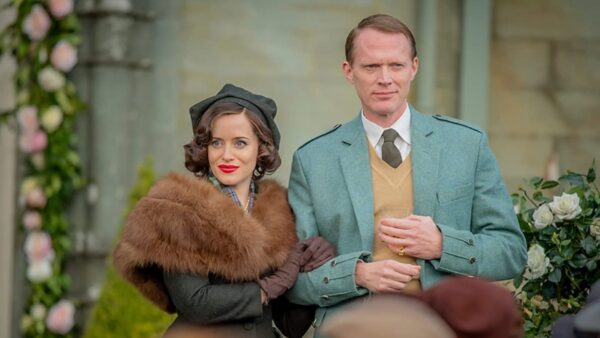
When most people think of a scandalously divorced woman who became a British Duchess, their minds turn to Wallis Simpson the American socialite who was the reason that the King of England abdicated in 1936. However, there was another cause celebre 30 years later when the heiress and divorcee Margaret Whigham and third wife of Ian Douglas Campbell, 11th Duke of Argyll was involved in a discreditable divorce that shocked both the aristocracy and the nation at large,
In an excellent new movie Brit filmmaker, Sarah Phelps tells the Argyll’s story from the Duchess’s point of view which very surprisingly has not been filmed before. Played by the ultra regal Claire Foy, the film starts with the Duchess on her way to Divorce Court with her chauffered Rolls Royce being surrounded by an angry mob calling her a ‘slut’ and other crude and somewhat vicious names.
Phelps then takes us back in a series of flashbacks to before the Argylls had even wed, and tells the story of how their marriage had disintegrated so badly.
This era in British culture was so patriarchal, especially in the aristocracy where women were considered mere chattels, and in the Duke’s case, an important source of finance. We see the future Duchess being part of London society and mixing with what was known as a ‘fast crowd’. She was never without a beau or suitor on her arm for as a beautiful socialite heiress she was considered quite a catch. After her first marriage to Charles Sweeney was dissolved she had several serious relationships and even got engaged again.
Argyll (Paul Bettany) who was about to inherit both the Dukedom and a ruin of a castle in Scotland had already gone through two (independently wealthy) wives before he married Margaret in 1951. She then spent a good part of her own fortune restoring the Castle to its former glory. The marriage didn’t seem to change either of their lives with the Duke carrying on his additions of drink and drugs which made him very violent at time, whilst the Duchess enjoyed having her affairs with other men.
 They didn’t have children together which became a bugbear between them, especially for the Duchess who was horrified to discover that the Castle she had paid for would be passed onto the Duke’s son by his first marriage and not to her or her own son.
They didn’t have children together which became a bugbear between them, especially for the Duchess who was horrified to discover that the Castle she had paid for would be passed onto the Duke’s son by his first marriage and not to her or her own son.
The Duke always suspected his wife of infidelity and, while she was in New York, he broke open her desk at her Mayfair home. What he found secreted away included a set of Polaroid photographs of the Duchess naked, save for her signature three-strand pearl necklace, in the company of another man. There were also photographs of the Duchess fellating a naked man whose face was not shown.
The Duke used these as grounds to sue for divorce to which the Duchess responded by suing the Duke for his misdemeanors. Despite the pressure and rumors, the Duchess refused to name the headless man, and with an arcane legal system as a woman, she really stood no chance. or winning. Not only did she lose but the judge, Lord Wheatly felt fit to add that “the evidence established that the Duchess of Argyll was a completely promiscuous woman whose sexual appetite could only be satisfied with a number of men”. He continued: “Her attitude to the sanctity of marriage was what moderns would call ‘enlightened’ but which in plain language was wholly immoral.”
Margaret , Duchess of Argyll as she then became known, may have made the tide turn regarding a women’s role in divorce, but she did it as a matter of self-preservation. As much as we loved Claire Foy’s impassioned Duchess, we were always aware that what she was doing was not for greater mankind, but for herself. The film hinted that many of her lovers back then had been closeted gay men in the days when homosexuality was illegal. For that alone and the fact that she always refused to kowtow down to public opinion. and thus for the next couple of decades after the divorce, she was a very noticeable and well-liked fixture in London society.
N.B. A Very British Scandal is screening on Amazon Prime from April 22nd

